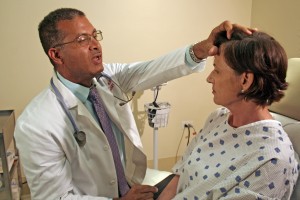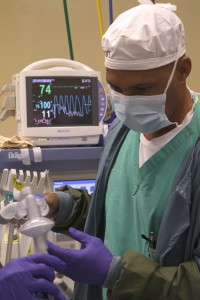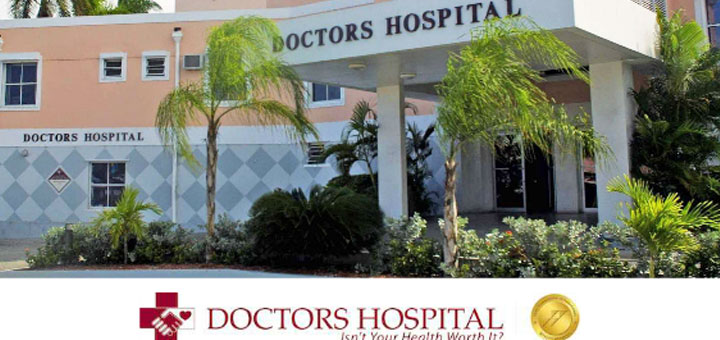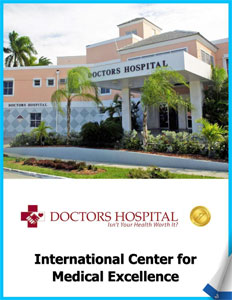Doctors Hospital Health System carving out a world-class niche.
The Bahamas-based Doctors Hospital Health System is made up of two distinct facilities in Nassau – the original Doctors Hospital, a 72-bed acute care location with intensive care capabilities and three surgical suites; and the newer Bahamas Medical Center, an ambulatory center for urgent care and medical fitness that serves as the foundation for the system’s medical tourism product.
The medical prowess is spelled clearly in black and white, but what the descriptions don’t cover is the behind-the-scenes work that goes into establishing a culture driven toward quality and process.
That’s where Barry Rassin comes in.
Rassin is president of the Doctors Hospital system, and spends much of his time envisioning a scenario in which the Bahamas becomes a world leader in medical tourism. That ultimate and lofty goal involves launch of a stem cell treatment center, a cochlear implant center and an international spine surgery program, alongside an expanded high-intensity ultrasound treatment for prostate cancer.
 But before the world arrives, he wants to make sure the place is ready for attention.
But before the world arrives, he wants to make sure the place is ready for attention.
“It’s all about not only providing quality of care, but being able to document that you are providing the quality of care, so that becomes critical to us,” he said. “We’re also a little different in the medical tourism industry in that we want to be able to involve patients before they ever leave home, to talk about why they’re coming, what they’re coming for and to make sure we meet their expectations.
“And then we’ll follow them up for a period of time to make sure there aren’t any needs once they go home. I don’t like the concept that some international sites are taking, where you fly in, you have surgery and you fly home, and then you’re on your own. If you get a complication and you go to a local doctor, they don’t want to touch you because they don’t know what happened internationally.
“I don’t want us to be like that.”
The dedication to medical tourism, though, isn’t solely about medicine.
Because the Bahamas is a small country (covering slightly more than 5,000 square miles) with a small population (home to less than 400,000 residents), the hospital system will perpetually be saddled with empty beds. If the range for patients is expanded beyond the island nation’s borders, however, the hospital system will be better able to compete in the local market in which healthcare is free.
“To expand our local market would be very difficult for us,” Rassin said. “They come to us for quality care, which is fine. But if I can get into the international market, then we can expand our business. That’s really why we’ve gotten into the (medical tourism) business, so we can expand as a company.”
Among the steps Rassin and the organization took to enhance the Bahamas’ desirability as a medical destination was gaining certification from Joint Commission International, a U.S.-based entity that identifies, measures and shares best practices in quality and patient safety around the world.
Other positive factors include having English as a primary language and being located in a place that’s already among the world’s top travel destinations. The main challenge, then, was ensuring that pricing for medical care was reasonable enough to successfully compete with other markets like Costa Rica or India, even though the cost of doing business is higher in the Bahamas than those places.
And when the prices can’t be equal, he said, the menu of services have to be unique, which is what prompted the aforementioned focus on stem cells, cochlear implants and spine surgeries, as well as fecal microbiota transplant – a procedure whose purpose is to replace good bacteria that’s been killed or suppressed by the use of antibiotics, resulting in infection by an overpopulation of bad bacteria.
 “We can provide pricing that’s 35 to 40 percent less than the U.S. average, so that’s kind of the niche we got into,” Rassin said. “That isn’t necessarily where the big activity is in medical tourism, which is why we need particular niche treatment areas that we’re going to go after that aren’t necessarily the cheapest, but may be unique to us.”
“We can provide pricing that’s 35 to 40 percent less than the U.S. average, so that’s kind of the niche we got into,” Rassin said. “That isn’t necessarily where the big activity is in medical tourism, which is why we need particular niche treatment areas that we’re going to go after that aren’t necessarily the cheapest, but may be unique to us.”
Rassin’s bottom-line objective is to enhance the international traffic to 50 percent of overall system revenues, which is a significant jump from the 18 percent share it accounts for now.
He conceded, though, that a bump to even 25 or 30 percent would be fiscally considerable.
The primary target markets for medical tourism visitors remain the United States, Canada and other Caribbean island nations, though China provides an intriguing possibility going forward thanks to Chinese ownership of a large local hotel under construction that Rassin believes will ultimately help raise the Bahamian profile in the world’s most populous country.
“You have to say (50 percent) is optimistic because it is just a budgeted figure,” he said. “But I believe it is realistic that we could increase, once we get the (fecal microbiota transplant) program going and the stem cell program going. I believe the activities in those two areas alone will help get us close to 50 percent of our business being from international patients.”
Getting to 25, 30 or 50 percent involves some marketing alongside the medicine, too.
The last two years, Rassin said, have been spent advertising the sheer fact that the Bahamas is a legitimate destination for medical procedures. Next up, he said, is translating that reality into actual activity, which is done through work with the Medical Tourism Association and its contacts, and, eventually, through linking up with self-funded employers and insurance companies that are looking for different and less expensive destinations for employees and customers.
Relationships have also been struck with Bahamian-bound airlines and domestic hotels to help secure better pricing for incoming patients for their travel and lodging needs.
Five years from now, Rassin expects all of today’s ground work to be paying dividends.
“By then, we will be an international destination, well-known in all the circles around the world that refer patients for international health care,” he said. “I’m certain we’ll get where we want to be.”
______________________________________
AT A GLANCE
WHO: Doctors Hospital Health System
WHAT: Medical organization consisting of two hospitals – Doctors Hospital and the Bahamas Medical Center – that provide acute and intensive care services and surgical capabilities
WHERE: Nassau, Bahamas
WEBSITE: www.DoctorsHosp.com
Preferred Partners
- Bahamas Medical & Surgical Supplies Ltd.
- International MED-X (Fort Myers, Fla.)
- MDMS International (Nassau, Bahamas)
- Nassau Agencies (Nassau, Bahamas)



 This information will never be shared to third parties
This information will never be shared to third parties